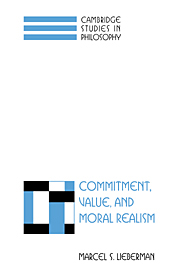5 - Self-conception and substantive commitments
Published online by Cambridge University Press: 02 December 2009
Summary
DAVID VELLEMAN ON SELF-CONCEPTION
Introduction
The kind of self-conception I defined in the previous chapter and its relation to objective value and beliefs are by no means uncontested. The strongest challenge to my position comes from Velleman with his “noncognitivist” theory of the self.
As I noted in chapter 2, self-understanding and the “intellectual desire” to make sense of oneself to oneself play important roles in Velleman's work. Recall that he distinguishes between self-awareness – knowing the “what” of one's actions – and self-understanding – knowing the “why” of one's actions (Velleman, Practical Reflection, pp. 15–16). More importantly, I remarked that Velleman viewed selfunderstanding as an “interpretive or explanatory” description of one's behavior. With this definition of self-understanding in mind, we can examine in what way it is related to one's self-conception.
In developing his theory of self-conception, Velleman begins with traits of character and shows that these, along with desires and beliefs, can also figure as reasons for action. One identifies a trait of character as a rationale of one's action because it is “the aspect of [one's] selfimage under which [one] comprehend[s] the action” (ibid., p. 249). That is, one's character, or collection of traits of character, provides a context in which one's actions can be understood. In light of the general desire for self-understanding, then, an action which accords with one's character will provide a greater reason for action since by the very fact of accordance it will enhance self-understanding.
- Type
- Chapter
- Information
- Commitment, Value, and Moral Realism , pp. 134 - 182Publisher: Cambridge University PressPrint publication year: 1998



